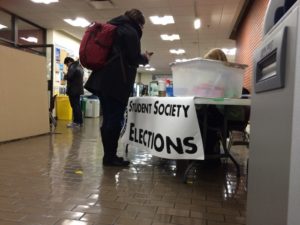Update: The CCSS elections have been extended until noon on Thursday, October 25.
The Camosun College Student Society (CCSS) fall student elections are happening from Monday, October 22 to Wednesday, October 24. Aside from the candidates for the CCSS board of governors, the election ballots will include two referendum questions.
The CCSS board of directors approved a motion on August 13 to hold a referendum on whether or not Camosun students should be members of the Canadian Alliance of Student Associations (CASA). The ballot will also have a referendum question about what to do with the Canadian Federation of Students (CFS) membership fees that the CCSS has continued to collect following the CFS’ June 9 decision to expel all BC member locals, including the CCSS, from the CFS. Every Camosun student paid roughly $9 in CFS fees between June and September; students now have a say in what they want that money to go toward. The CCSS is asking if students would approve of the money going to a CCSS campaigns and advocacy fund, for now. At some point before December 31, 2019, the amount that was being collected from Camosun students for CFS fees will go to the British Columbia Federation of Students, which is raising its fee by the same amount that Camosun students were paying the CFS.

CCSS executive director Michel Turcotte says if students don’t want their money to go to the CCSS campaigns and advocacy fund, the money will likely go straight to the BCFS. The CCSS would use the campaigns and advocacy fund for campaign- and advocacy-related activities and, potentially, to pay CASA fees. As outlined in the referendum question, if the CCSS joins CASA, students would not start paying CASA membership fees until January 1, 2020.
Turcotte adds that not all students necessarily know what is going on with the situations with the CFS, the BCFS, and CASA, so for context, there will be some preamble to the two questions asked.
“Students may not quite understand that they are being faced with this choice because we are no longer a member of a federal lobbying group, and that it’s likely in the interest of colleges to lobby federally,” says Turcotte.
The number of initiatives and funding mechanisms that are controlled by the federal government that relate to post-secondary education, says Turcotte, is something that a lot of students also might not quite understand, either.
“Student loans, and student grants, and things like that are all regulated and paid for federally,” says Turcotte, “even though education is within the provincial sphere of responsibilities under the [Canadian] constitution. To ignore the federal arena is not something that would be in students’ interests.”
Second year University Transfer student Charlotte Close grew up in a household where her whole family voted; she says she intends to vote in the CCSS election when the polls open.
“I think they’re important to get the full student perspective of the college and not just the upper people,” says Close. “A girl in my history class is involved in that; she and I were talking about it, so she’s convinced me.”
First-year Mental Health and Addictions student Rachel Spall says it’s important that students vote.
“I believe it’s important to have a word and a say,” says Spall, adding that she has not looked into the voting process but will vote if she becomes more informed. “But I probably won’t if I’m ignorant to the information. I got the email [from the CCSS, about voting], I just haven’t really looked at it.”
First-year Criminal Justice student Oliver Sherring says voting in student elections is kind of like voting in any election.
“You have the power to make things the way you want them to be, and that may seem kind of selfish, but it’s up to you to decide how you want to spend your time at college, because it is probably the most important time in a young person’s life,” says Sherring.
Voting isn’t the only way to speak up about student issues. CCSS external executive Fillette Umulisa says it is important for students to become involved with the CCSS by running in the elections. Although the student society is made up of both students and non-student staff members, the majority are students; they help make everything the CCSS does possible. Umulisa says students are the backbone of the CCSS.
“People should know that the Camosun College Student Society is only going to exist if students run in the elections,” says Umulisa. “If students want to bring change to Camosun throughout their time here at the college, they need to get involved with the student society, and they need to run.”
